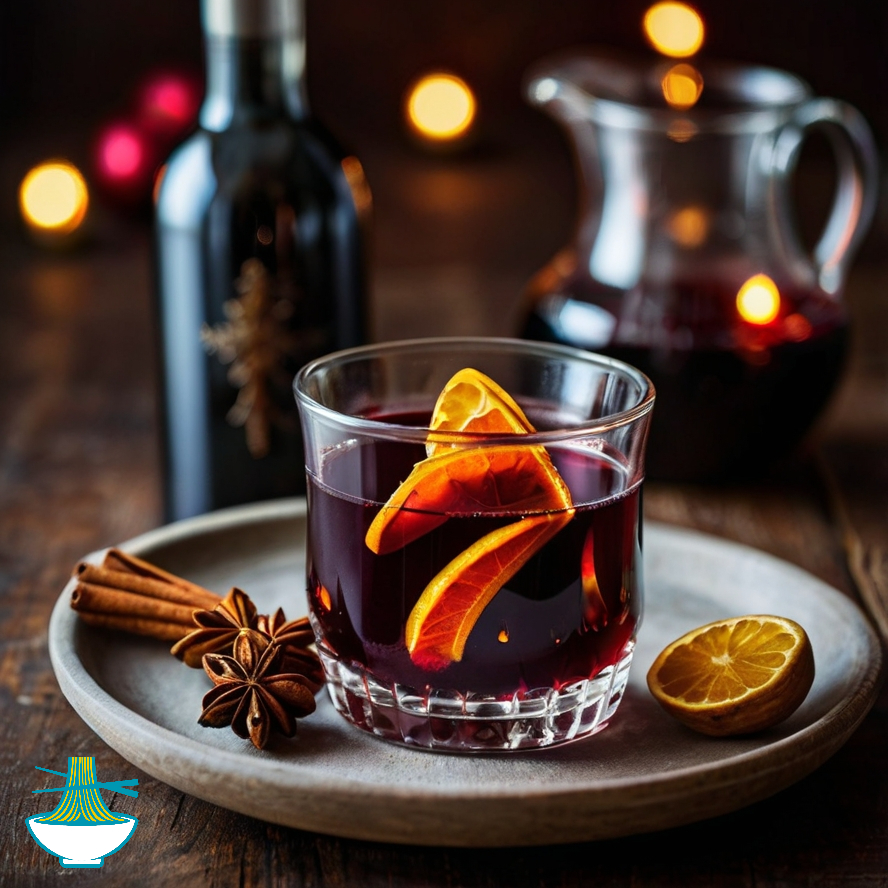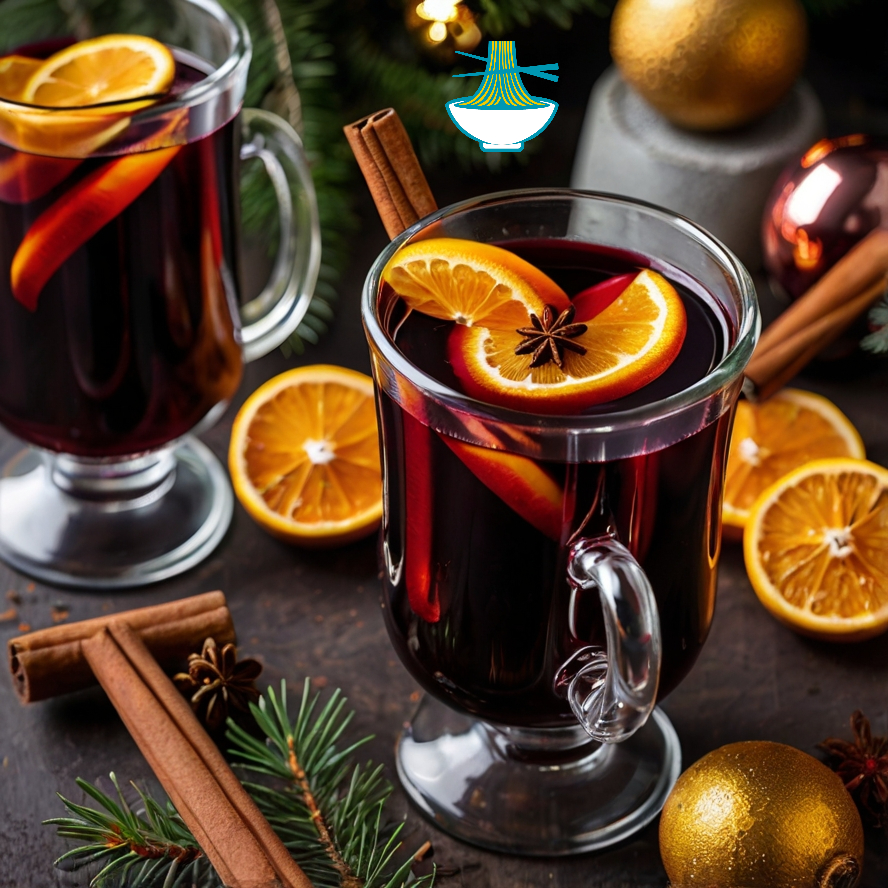Mulled wine is a delightful and aromatic beverage that perfectly complements the festive spirit of Merry Christmas. This warm drink combines rich red wine with spices like cinnamon, cloves, and nutmeg, offering a cozy experience that’s ideal for chilly winter nights. Whether you're gathering with friends and family or enjoying a peaceful evening by the fire, this recipe is sure to bring warmth and joy to your holiday celebration. In addition to its comforting taste, mulled wine also provides beneficial vitamins and minerals like Vitamin C, which boosts your immune system; iron, which supports healthy blood circulation; and magnesium, which aids in relaxation. This mulled wine recipe is the perfect way for any foodie to enhance their Christmas festivities while enjoying a nourishing and flavorful drink.
Ingredients:
- 750 ml red dry wine (can be replaced with non-alcoholic red wine)
- 100 grams sugar (can be substituted with natural sweeteners like honey or stevia)
- 2 cinnamon sticks
- 4 whole cloves
- 1 orange (peeled and sliced, can be substituted with organic orange or lemon)
- 1 apple (peeled and sliced, can be substituted with organic apple)
- 1 tsp ground nutmeg (optional, can be replaced with turmeric for a warm, healthy flavor)
- 1 tsp freshly grated ginger (optional, can be replaced with dried ginger or turmeric)
- 50 ml water (optional, to adjust the consistency)
- 1 tsp vanilla extract (optional)
Preparation Instructions:
1. Prepare the Ingredients:
- Slice the orange into thin rounds, and also slice the apple. You can include the orange peel with the slices for extra flavor.
- Pour the red wine into a large pot over medium heat.
- Add the sugar to the wine and stir well until the sugar dissolves completely.
2. Add the Spices:
- Add the cinnamon sticks and whole cloves to the pot. If you prefer a stronger flavor, you can increase the amount of cloves.
- Stir in the ground nutmeg and freshly grated ginger, if using.
- Add the orange and apple slices to the mixture and stir to combine all the ingredients.
3. Simmer the Mixture:
- Lower the heat to a simmer and let it cook for 20-30 minutes, stirring occasionally.
- You can add water gradually if you prefer a lighter consistency or to adjust the flavor.
- Once the mixture is hot and fragrant, add the vanilla extract, if using, and simmer for a few more minutes.
4. Strain and Serve:
- After simmering, strain the mixture through a fine mesh strainer to remove the solids.
- Serve the mulled wine in small mugs or glasses, garnished with extra orange or apple slices if desired.
Tips for Enhancing Flavor:
- Use the Right Kitchen Tools:
- A spice grinder can help you get fresh ground spices like nutmeg and ginger, enhancing the flavor of your mulled wine.
- Toasting the spices lightly in a pan before adding them to the pot can intensify their aroma and flavor.
- Add Extra Flavor Notes:
- For a unique twist, try adding aromatic herbs like rosemary or thyme to the wine while it simmers for a new, fragrant flavor.
- To balance the sweetness and acidity, add a few drops of fresh lemon juice after straining the mulled wine.
- Control the Temperature:
- Keep the wine at a gentle simmer, not a rolling boil, to avoid the rapid evaporation of alcohol and to retain the deep flavors of the spices.
Frequently Asked Questions (FAQ) for Mulled Wine
1. Can I make mulled wine ahead of time?
Yes, you can make mulled wine ahead of time! In fact, mulled wine often tastes even better the next day after the flavors have had time to meld together. Simply prepare the wine, spices, and fruits as directed, let it cool, and store it in an airtight container in the refrigerator. When you're ready to serve, gently reheat it over low heat, ensuring it doesn’t boil. This way, you can enjoy a flavorful mulled wine with minimal effort when guests arrive.
2. Can I adjust the sweetness of mulled wine?
Absolutely! The sweetness of mulled wine is customizable to suit your taste. If you prefer a less sweet version, you can reduce or omit the sugar entirely. Alternatively, you can substitute regular sugar with natural sweeteners like honey, maple syrup, or stevia. Start with a smaller amount of sweetener and adjust it gradually, tasting as you go, until you reach your desired level of sweetness.
3. How do I make mulled wine without alcohol?
To make non-alcoholic mulled wine, simply substitute the red wine with a non-alcoholic red wine or grape juice. There are several brands of non-alcoholic wine available that maintain the deep, rich flavor of regular wine. You can also use fruit juices like cranberry or pomegranate juice for a unique twist. Follow the same recipe for the spices and fruits, and you'll have a delicious, alcohol-free version of mulled wine that’s perfect for everyone.
4. Can I add other fruits to my mulled wine?
Yes, you can get creative with the fruits in your mulled wine! While the traditional recipe calls for orange and apple, feel free to experiment by adding fruits like pears, cranberries, or even pomegranate seeds. Adding fresh berries can also provide a vibrant color and unique flavor profile. Just make sure the fruits you add are in balance with the spices to avoid overpowering the wine’s flavor.
5. Can I use a slow cooker for making mulled wine?
Yes, a slow cooker is a fantastic option for making mulled wine, especially if you're hosting a large group. Simply combine all of the ingredients in the slow cooker, set it to low, and let it simmer for 2-3 hours. This method helps the flavors develop slowly, and the slow cooker can keep the mulled wine warm for extended periods without the need for constant attention. Just be sure to monitor the temperature so it doesn't get too hot or boil, which could alter the taste.
Nutrition Value:
1. 750 ml Red Dry Wine
- Calories: 500-600 kcal (depends on wine brand and type)
- Carbohydrates: 15-20 g
- Protein: 1-2 g
- Fat: 0 g
- Sodium: 5-10 mg
- Cholesterol: 0 mg
- Vitamins: Contains some B vitamins, particularly B6, and antioxidants like flavonoids and resveratrol.
- Minerals: Potassium, calcium, and magnesium in small amounts.
- Nutritional Benefit: Red wine is rich in antioxidants, particularly resveratrol, which is known for supporting heart health. It also provides some potassium and magnesium, contributing to electrolyte balance. Non-alcoholic wine still offers antioxidants but without the alcohol content.
2. 100 grams Sugar
- Calories: 387 kcal (for 100 g of sugar)
- Carbohydrates: 100 g
- Protein: 0 g
- Fat: 0 g
- Sodium: 0 mg
- Cholesterol: 0 mg
- Vitamins: None
- Minerals: None
- Nutritional Benefit: Sugar is primarily used for sweetness. While it provides quick energy, it's a simple carbohydrate that doesn't offer significant nutritional value. Natural sweeteners like honey or stevia provide a healthier alternative, with honey offering antioxidants and a natural flavor.
3. 2 Cinnamon Sticks
- Calories: 6 kcal (for 2 sticks)
- Carbohydrates: 2 g
- Protein: 0 g
- Fat: 0 g
- Sodium: 0 mg
- Cholesterol: 0 mg
- Vitamins: Small amounts of Vitamin K.
- Minerals: Manganese, calcium, iron.
- Nutritional Benefit: Cinnamon contains antioxidants and has anti-inflammatory properties. It can help regulate blood sugar and improve heart health. Manganese supports bone health and metabolism, while iron aids in red blood cell production.
4. 4 Whole Cloves
- Calories: 6 kcal
- Carbohydrates: 1.5 g
- Protein: 0 g
- Fat: 0 g
- Sodium: 0 mg
- Cholesterol: 0 mg
- Vitamins: Small amounts of Vitamin K and C.
- Minerals: Manganese, calcium, magnesium.
- Nutritional Benefit: Cloves are rich in antioxidants, particularly eugenol, which has anti-inflammatory and antimicrobial effects. They also help improve digestion and may support bone health with the calcium and manganese content.
5. 1 Orange (Peeled and Sliced)
- Calories: 62 kcal (for 1 medium orange)
- Carbohydrates: 15 g
- Protein: 1 g
- Fat: 0 g
- Sodium: 0 mg
- Cholesterol: 0 mg
- Vitamins: High in Vitamin C (70 mg per orange), Vitamin A, B6.
- Minerals: Potassium (230 mg).
- Nutritional Benefit: Oranges are a great source of Vitamin C, which supports immune health, skin health, and collagen production. They also provide fiber and potassium, contributing to heart health and digestive function.
6. 1 Apple (Peeled and Sliced)
- Calories: 95 kcal (for 1 medium apple)
- Carbohydrates: 25 g
- Protein: 0.5 g
- Fat: 0 g
- Sodium: 2 mg
- Cholesterol: 0 mg
- Vitamins: Small amounts of Vitamin C and Vitamin A.
- Minerals: Potassium (195 mg).
- Nutritional Benefit: Apples provide a good source of dietary fiber, aiding in digestion. They also offer some Vitamin C and potassium, which contribute to immune function and heart health.
7. 1 tsp Ground Nutmeg
- Calories: 6 kcal (for 1 tsp)
- Carbohydrates: 1 g
- Protein: 0 g
- Fat: 0.5 g
- Sodium: 0 mg
- Cholesterol: 0 mg
- Vitamins: Small amounts of Vitamin C and Vitamin A.
- Minerals: Manganese, magnesium, iron.
- Nutritional Benefit: Nutmeg contains antioxidants and has anti-inflammatory properties. It supports digestion, boosts mood, and has antimicrobial benefits. Alternatively, turmeric offers similar anti-inflammatory properties and additional benefits for brain health.
8. 1 tsp Freshly Grated Ginger
- Calories: 5 kcal (for 1 tsp)
- Carbohydrates: 1 g
- Protein: 0 g
- Fat: 0 g
- Sodium: 0 mg
- Cholesterol: 0 mg
- Vitamins: Small amounts of Vitamin B6 and C.
- Minerals: Manganese, magnesium, potassium.
- Nutritional Benefit: Ginger is known for its digestive benefits and anti-inflammatory properties. It helps reduce nausea, improves circulation, and has potential benefits for pain relief and immunity.
9. 50 ml Water
- Calories: 0 kcal
- Carbohydrates: 0 g
- Protein: 0 g
- Fat: 0 g
- Sodium: 0 mg
- Cholesterol: 0 mg
- Vitamins: None
- Minerals: None
- Nutritional Benefit: Water helps adjust the consistency of the mulled wine, making it lighter and more drinkable without adding any calories or nutrients. It is essential for hydration and maintaining bodily functions.
10. 1 tsp Vanilla Extract (Optional)
- Calories: 12 kcal (for 1 tsp)
- Carbohydrates: 1 g
- Protein: 0 g
- Fat: 0 g
- Sodium: 1 mg
- Cholesterol: 0 mg
- Vitamins: None
- Minerals: None
- Nutritional Benefit: Vanilla extract provides a subtle, sweet flavor without adding many nutrients. It also contains trace amounts of antioxidants, contributing to overall well-being.
By combining these ingredients, mulled wine becomes not only a flavorful and festive drink but also one that offers a variety of health benefits, from supporting immune function to improving digestion and providing essential minerals.


Comments